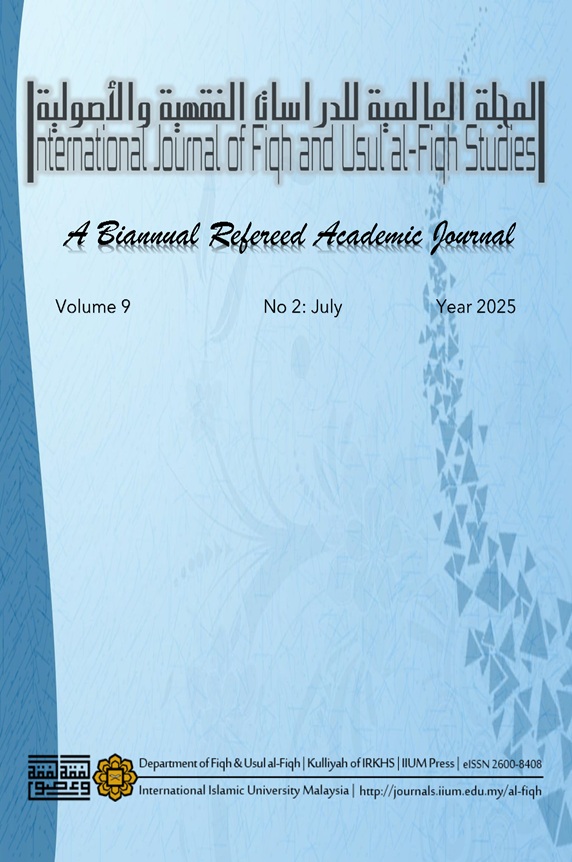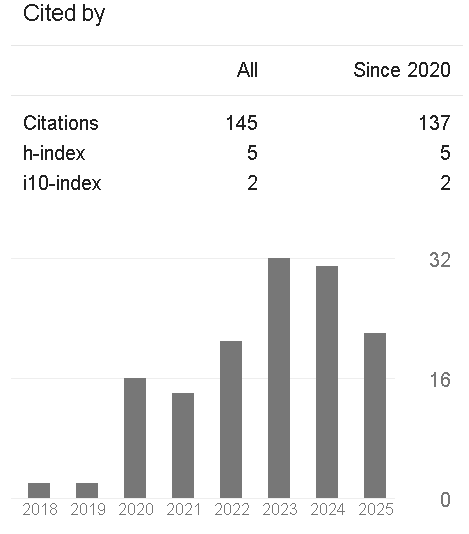Major Familial Challenges in Malaysia: Empirical Findings and Fiqh-Based Solutions
DOI:
https://doi.org/10.31436/ijfus.v9i2.380Keywords:
Fiqh-based Solutions, Muslim families, Parenting, Maqāṣid al-Sharīʿah, Islamicization of the SelfAbstract
Muslim families in Malaysia face growing challenges stemming from modernization, digital disruption, economic pressures, and secular influences. These shifts have contributed to increasing marital conflict, parental neglect, intergenerational tensions, and erosion of religious values. While public discourse often emphasizes psychological and ethical reform, there remains an urgent need for concrete juristic responses rooted in the Islamic legal tradition. This study integrates classical fiqh rulings with empirical findings from a field survey involving 67 IIUM staff, who assessed key family-related challenges and the relevance of principles such as wasaṭiyyah and Islamicization of the Self. Framed within the objectives of Islamic law (maqāṣid al-Sharīʿah), the analysis highlights how Islamic jurisprudence provides structured legal tools—such as faskh, ḥaḍānah, ṣulḥ, and taʿzīr—to preserve dignity, ensure justice, and restore family harmony. The study affirms that fiqh, when guided by moderation and ethical awareness, remains an adaptable and authoritative framework for addressing contemporary familial disruptions.
Downloads
Metrics
References
Abdul Rahman, S., & Hassan, R. (2015). Faktor-faktor penyumbang kepada perceraian dalam kalangan pasangan Islam di Malaysia. Jurnal Sains Sosial dan Kemanusiaan, 10(1), 45–55.
Abdullah, H. (2025). Generasi sandwich di Malaysia: Tantangan dan peranan dalam keluarga modern. Institut Pengajian Sains Sosial UPM. https://ipsas.upm.edu.my/
al-Dusūqī, M. ibn A. (2000). Ḥāshiyat al-Dusūqī ʿalā al-Sharḥ al-Kabīr. Dār al-Fikr.
al-Ghazālī, A. Ḥ. M. ibn M. (2005). Iḥyāʾ ʿUlūm al-Dīn. Dār al-Maʿrifah.
al-Kāsānī, ʿA. al-D. A. B. ibn M. (1986). Badāʾiʿ al-Ṣanāʾiʿ fī Tartīb al-Sharāʾiʿ. Dār al-Kutub al-ʿIlmiyyah.
al-Kharashī, M. ibn ʿA. A. (1997). Sharḥ al-Kharashī ʿalā Mukhtaṣar Khalīl. Dār al-Fikr.
al-Nawawī, Y. ibn S. (1996). Al-Majmūʿ Sharḥ al-Muhadhdhab. Dār al-Fikr.
al-Shāṭibī, A. I. I. ibn M. (2004). Al-Muwāfaqāt fī Uṣūl al-Sharīʿah (A. Darrāz, Ed.). Dār al-Kutub al-ʿIlmiyyah.
al-Shirbīnī, M. ibn A. (1997). Mughnī al-Muḥtāj ilā Maʿrifat Maʿānī Alfāẓ al-Minhāj. Dār al-Fikr.
al-Tirmidhī, M. ibn ʿĪsā. (1994). Sunan al-Tirmidhī. Dār al-Salām.
Arifin, L., & Suhaimi, N. S. (2019, May). Didik ummah tolak sekularisme. Berita Harian. https://www.bharian.com.my/
Azura Tamat, & Vellymalay, S. K. N. (2019). Warga emas dan pilihan penempatan di pusat jagaan harian. Journal of Social Sciences and Humanities, 16(4), 1–22.
CENTRIS IIUM. (2022, January). Islamicization of the self [Lecture by Prof. Emeritus Dr. Mohd Kamal Hassan].
Che' Sharif, N., Abdullah, A., Rahman, M., & Hassan, S. (2018). Pengalaman dan faktor pengabaian warga emas dalam komuniti. Journal of Social Sciences and Humanities, 10(1), 118–134.
Hassan, M. H. (2014). Wasatiyyah as explained by Prof. Muhammad Kamal Hassan: Justice, excellence and balance. Counter Terrorist Trends and Analysis, 6(2), 24–30.
Hisham, M. A. F. (2025). Kes keganasan rumah tangga meningkat, pindaan AKRT dikaji. RTM Berita. https://berita.rtm.gov.my/
Ibn al-ʿArabī, M. ibn ʿA. A. (2003). Aḥkām al-Qurʾān. Dār al-Kutub al-ʿIlmiyyah.
Ibn Mājah, M. ibn Y. (2000). Sunan Ibn Mājah. Dār al-Salām.
Ibn Qudāmah, A. M. ʿA. A. ibn A. (2004). Al-Mughnī. Maktabat al-Riyāḍ al-Ḥadīthah.
Ibn Taymiyyah, A. ibn ʿA. al-Ḥ. (1996). Majmūʿ Fatāwā Shaykh al-Islām Ibn Taymiyyah. Maktabat al-ʿUbaykān.
Ismail, S. H. S., Hamjah, S. H., Rahman, A. A., & Zain, N. M. (2021). Isu kekeluargaan dan sosiobudaya masa kini: Punca dan penyelesaiannya. International Journal of Islam and Contemporary Affairs, 1(2), 1–20.
JAKIM. (2019). Garis panduan penggunaan media sosial menurut perspektif Islam. Jabatan Kemajuan Islam Malaysia.
JAKIM. (2022). Laporan tahunan perkahwinan dan perceraian Islam. Jabatan Kemajuan Islam Malaysia.
Muhammad, F. S., Saidon, R., Ahmad, M. H., & Ibrahim, Z. (2024). The need to improve the family cases management system in Malaysia's Shariah courts. Akademika, 94(1), 107–117.
Muslim ibn al-Ḥajjāj. (2007). Ṣaḥīḥ Muslim (F. ʿAbd al-Bāqī, Ed.). Dār al-Salām.
Najmuddin, A. H., Nur Khamimah, & Ufaira, N. S. (2023). Perceraian di era digital: Pengaruh media sosial dan teknologi. Causa: Jurnal Hukum dan Kewarganegaraan, 1(4), 51–60. https://doi.org/10.3783/causa.v1i4.792
Santos, R. S., Galicia, M. B., Rodriguez, A. P., & Martinez, L. C. (2024). Growing up with temporarily absent parents: The case of Southeast Asian young adults. International Journal for Multidisciplinary Research, 6(4). https://doi.org/10.36948/ijfmr.2024.v06i04.23159
Shafie, R., & Mohd Zin, N. (2020). Kekurangan pendidikan agama dalam perkahwinan dan hubungannya dengan kadar perceraian. Malaysian Journal of Islamic Studies, 15(2), 120–135.
Downloads
Published
How to Cite
Issue
Section
License
Copyright (c) 2025 International Journal of Fiqh and Usul al-Fiqh Studies

This work is licensed under a Creative Commons Attribution-NonCommercial 4.0 International License.
The IIUM journal follows the open access policy.
Consent to publish: The Author(s) agree to publish their articles with IIUM Press.
Declaration: The Author(s) declare that the article has not been published before in any form and that it is not concurrently submitted to another publication, and also that it does not infringe on anyone’s copyright. The Author(s) holds the IIUM Press and Editors of the journal harmless against all copyright claims.
Transfer of copyright: The Author(s) hereby agree to transfer the copyright of the article to IIUM Press, which shall have the exclusive and unlimited right to publish the article in any form, including in electronic media. However, the Author(s) will reserve the right to reproduce the article for educational and scientific purposes provided that the written consent of the Publisher is obtained. For the article with more than one author, the corresponding author confirms that he/she is authorized by his/her co-author(s) to grant this transfer of copyright.





















